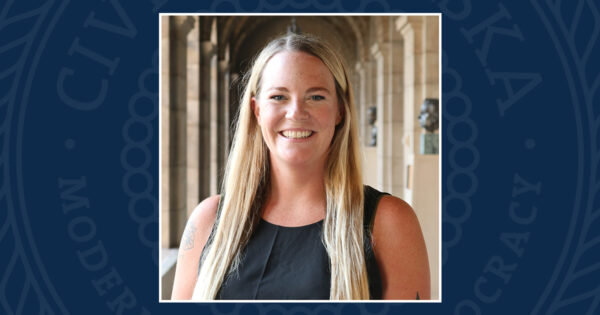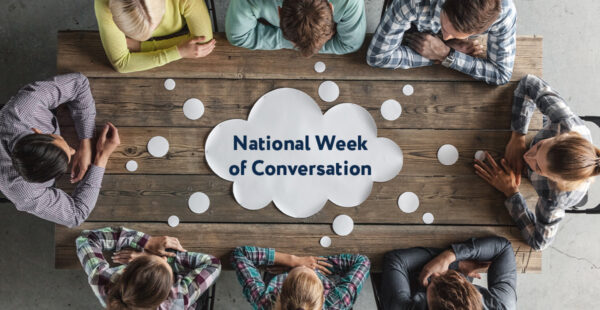There is a black-and-white vinyl sticker affixed to the back of Gabriella Nova’s laptop computer that reads Somebody Should Do Something. With that same laptop, she takes her sticker’s advice. The visual storyteller and Lincoln native documents the lives of historically underrepresented Nebraskans with an eye on creating systemic change.
 In 2018, while partnering with the community-organizing partnership Collective Impact Lincoln, Gabriella (or Gab as she is best known) created Stories of Impact, a series of photos and videos highlighting everyday residents of the city’s lowest-income neighborhoods. In 2020, she brought urgency and humanity to the swelling eviction crisis with Behind on Rent, a short film featuring Nebraskans facing the loss of their homes. All the while, Gab coordinates the program Untold Migrant Stories, which empowers young immigrants to tell and share their stories through digital media.
In 2018, while partnering with the community-organizing partnership Collective Impact Lincoln, Gabriella (or Gab as she is best known) created Stories of Impact, a series of photos and videos highlighting everyday residents of the city’s lowest-income neighborhoods. In 2020, she brought urgency and humanity to the swelling eviction crisis with Behind on Rent, a short film featuring Nebraskans facing the loss of their homes. All the while, Gab coordinates the program Untold Migrant Stories, which empowers young immigrants to tell and share their stories through digital media.
It’s tempting to offer up the cliché that Gab “gives voice to the voiceless.” Through potent documentary storytelling, she certainly does leverage the modern communications methods at her disposal to lift up the stories of the underrepresented, the disadvantaged, and the vulnerable. But Gab also understands that “giving voice to the voiceless” is only half of the equation; the other half is ensuring that those voices are meaningfully heard.
That’s why her work is fashioned to be more than just consumed; it’s intended to start a conversation, engage a broader community, and inspire action. Stories of Impact led to public screenings and exhibition-style gatherings, including an event at a local Asian culture center that drew hundreds to a community discussion about broad community investment in lower-income neighborhoods. And with Behind on Rent, Gab took advantage of Zoom to host a virtual screening and roundtable discussion about housing issues that were exacerbated by the coronavirus. Nearly 200 elected leaders, nonprofit heads, organizers, and community advocates participated.
Truly representative democracy happens when all voices, taken together, are heard. And that can only happen if all of us, regardless of station or background, have the capacity to tell our stories and express ourselves. Having a greater voice leads to more influence, a real ability to hold our officials and institutions accountable, the power to guide more inclusive priorities, and build a consensus around tackling the big issues of the day. Adding as many voices as possible to the existing debate opens the opportunity for new realities and new possibilities.
The good news is that right now, it’s easier than ever to express ourselves to ever-larger audiences. Thanks to modern communications technology, projecting our voices in ways that were unimaginable 25 years ago is practically second nature. Groups that once struggled to establish a foothold in the national conversation now can raise their visibility with a click of a mouse, a mass email, or a text. From the Tea Party to Black Lives Matter, like-minded Americans quickly and effectively connect across time and space. And they are demanding their say.
Wouldn’t it be wonderful if this is where the story ends? The democratization of information systems creates true equality. But as we know, this process does not exist in a vacuum. Asymmetrical structures of power still sustain the status quo, and they have proven to be quite sturdy. Even as more people find new ways to advance their views through mobile technology and social networking, those at the top use the same tools to maintain the retrenchment, social exclusion, and marginalization that first propelled them to power. And, of course, our nation’s political dynamics fortify this framework, with powerful interests creating their own “bubbles” to insulate themselves from the wants and needs of ordinary Americans.
In such a fragmented and noisy environment, does a temporarily trending hashtag or a viral video really make a bit of a difference?
It would be easy to say no. When the loudest and most powerful voices threaten to drown out all others, those who remain unheard can become isolated, depressed, or even angry. Over time, this threatens to erode our collective civic health. Left untended, it fuels distrust, belligerence, broken relationships, and a civil society too worn down to function. Trapped in our singular worldviews, we become increasingly polarized and quick to conflict. And nothing changes.
And yet, a world overwhelmed by sound and fury can be tamed by the oldest of human currencies: our stories. It can be brought to heel by the basic law that The Many are greater than The Few. Our stories have immense power. They elicit emotions, humanize abstract concepts, build deeper connections to the world around us, and bring purpose to our discourse. As democratic citizens, it is our obligation to amplify others’ voices and stories in the pursuit of a more equal society. Being careful not to be those voices, we can take substantive steps toward transforming communities and reforming institutions into places and structures where all voices are respected and valued.
This has lasting, positive effects on democracy – and on us as individuals. Being open to someone else’s perspective is emotionally and psychologically healthy. And, research shows, so is providing our perspective to another person or group of people. This makes perfect sense: All humans desire to be heard and understood; when our words and experiences are acknowledged, we feel respected and trusted. Respect and trust are also infectious. They lead to cooperation, consensus, and mutual concern.
In person or online, via word of mouth or in our social networks, whether we are talented documentary filmmakers or whether we merely hit “Share,” we must never stop raising others’ voices. We must never stop spreading the stories of others. Word by word, frame by frame, more and more people will go from unheard to heard, misunderstood to understood. From there, anything is possible.





